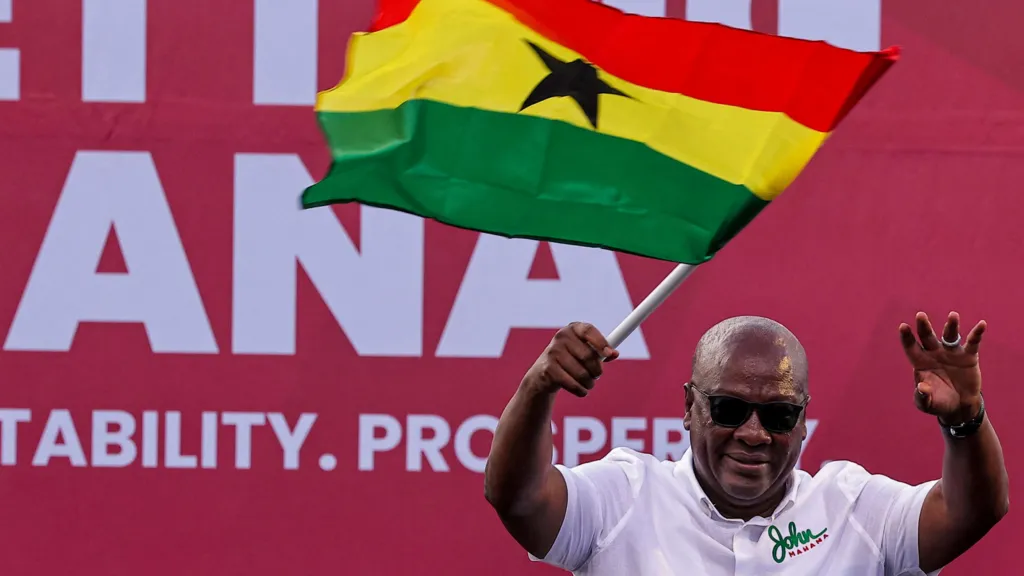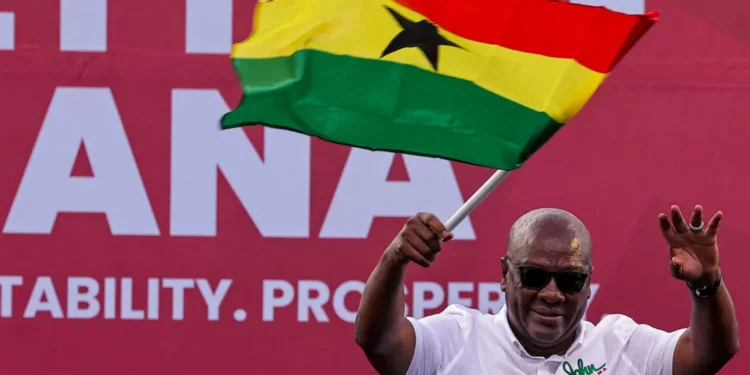- Ghana’s former President, John Mahama, has won the country’s presidential elections.
- Mahama’s main competitor, Vice President Mahamudu Bawumia, conceded an early defeat.
- Mahama’s anticipated return to the presidency marks a new chapter in Ghana’s political landscape.
Ghana’s former President John Mahama has won the country’s presidential elections after his main competitor, Vice President Mahamudu Bawumia, conceded defeat. Bawumia said he had called John Mahama of the National Democratic Congress (NDC) to congratulate him. Mahama confirmed on his X (formerly Twitter) profile that he had received Bawumia’s congratulatory call over his “emphatic victory.”
Blaring horns and jubilation, John Mahama’s supporters were already convening and celebrating outside NDC’s campaign headquarters in Ghana’s capital, Accra.
“The people of Ghana have spoken, the people have voted for change at this time, and we respect it with all humility,” Bawumia said in a news conference on Sunday. The vice president also said Mahama had “decisively” secured the presidency.
Earlier, NDC spokesperson Sammy Gyamfi, while speaking to reporters, said an internal review from the party placed Mahama’s victory at 56.3 per cent of the vote against Bawumia’s 41.3 per cent. Moreover, according to the NPP’s internal tally of votes, the NDC won the parliamentary election. Ghana’s election commission had said the official vote tally was likely due by Tuesday.
“It is very clear the people of this country have voted for change,” Gyamfi said.
Saturday’s election defeat ended the governing party, the New Patriotic Party (NPP), two terms in power under President Nana Akufo-Addo. During this period, Ghana underwent the worst economic crisis in decades, marked by record-high inflation and default on debt.
Ghana’s economic woes dominated the presidential election campaigns after Africa’s leading gold producer’s economic woes, currency devaluation and debt default culminated in an unprecedented $3 billion International Monetary Fund bailout. The elections were marked by seemingly low voter turnout and intense competition.
Read Also: Ghana Heads to Elections Amid a Gripping Economic Crisis
John Mahama Makes History

John Mahama was Ghana’s president from July 2012 to January 2017. The former president’s win marks a historic victory, making him the first leader since Ghana’s return to multi-party democracy to return to the presidency after being voted out. This was his third attempt after losing subsequent attempts in 2016 and 2020.
During his campaign, Mahama focused on economic recovery and inclusive development, resonating with voters seeking change during a period of financial hardship.
Mahama promised to “reset” the West African nation on various fronts while trying to appeal to the country’s young electorate. Regarding corruption, Mahama vowed to create a new office to probe government procurement above a $5 million threshold during the campaign. According to Mahama, unchecked procurement processes are Ghana’s major source of corruption.
Mahama’s anticipated return to the presidency marks a new chapter in Ghana’s political landscape, with many looking forward to how his administration will tackle the country’s pressing economic and social challenges.
Africa’s Most Stable Democracy
Ghana is widely regarded as one of Africa’s most stable democracies, boasting a longstanding history of peaceful power transitions. Sound institutions, political maturity, and an inclusive and tolerant society contribute to Ghana’s democratic stability. Since the return of multiparty democracy in 1992, the country’s two main parties, the NDC and the NPP, have alternated in power equally.
In resonance with this trend, Dr. Bawumia’s concession is viewed as a statesmanlike move intended to ease tensions and promote national unity. It also demonstrates the maturity of Ghana’s democratic institutions and the commitment of its citizens to uphold democratic norms.
Ghana’s political culture is defined by significant tolerance levels among its various ethnic and religious communities. Notwithstanding its diverse ethnic composition, political conflicts very rarely escalate into pervasive ethnic violence. This contrasts with other African nations, where ethnic tensions significantly compromise democratic stability.
While Ghana is a beacon of democratic stability, it faces challenges like corruption and economic inequality. The 2024 general election will undoubtedly be remembered as a historic moment. It highlights Ghanaians’ desire for change and the nation’s collective aspiration for progress and prosperity. The spotlight turns to Mahama, with political analysts noting he must address the pressing issues to maintain and strengthen Ghana’s democratic credentials.









